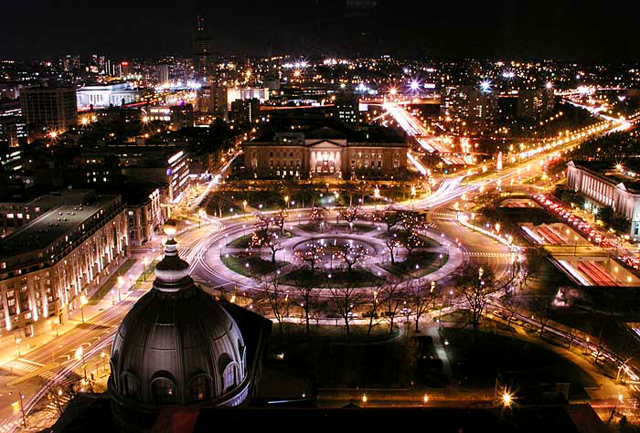
Cities: Building on our ‘opportunity’ infrastructure
An image of a bustling Philadelphia, Pa., one of 26 Knight communities. Photo by Flickr user George Smyth.
As America bolts to its demographic destiny of a majority people of color nation, dozens of cities are already there. This growing diversity is our greatest asset, a competitive edge in a world without boundaries, if we leverage the talent of everyone. But right now, we do not.
The urban renaissance is occurring against the backdrop of rising inequality and persistent racial inequity. The resulting friction sometimes overshadows, and in the long run threatens to undermine, the incredible opportunities afforded by the resurgence of cities. To maintain their competitive advantage, cities will have to address the following tough questions.
- Who benefits from the investments?
- Who gets to live in dense neighborhoods rich in culture and opportunity?
- How do we open up opportunity to everyone?
To answer these questions, we need fresh thinking about job creation, transportation, land use, economic development and everything that makes cities tick. At the same time, we need to lift up groundbreaking local efforts that are beginning to fuse equitable place-making and 21st century economic development.
How can cities meet these challenges?
Increasingly, public-private partnerships, foundations and innovators are stepping forward to fill these gaps. I’m part of one such effort – as a reader for the Knight Cities Challenge, a $5 million competition just launched last week to encourage applicants to submit answers to the question “What’s your best idea to make cities more successful?” Other efforts, from funders such as the Bloomberg Philanthropies, are also pressing for new ideas to create opportunity in cities.
Cities are magnets for all things current and have incubated opportunity for centuries. They are home to the nation’s opportunity infrastructure: public transit systems, diverse economies, grand squares and inspiring architecture, longstanding community institutions, and global networks. This is an extraordinary moment in the history of American cities, one in which a new premium is being placed on this opportunity infrastructure.
For us to take advantage of this infrastructure – especially at a time of limited government support, we need to seize it full force, with big ideas and bold strategies guided by a vision of equity, inclusion, and economic integration. This equity agenda—just and fair inclusion—has become the American agenda, and our cities need to lead the way.
After a half century of relentless suburbanization that left cities struggling for investment and jobs, America is realizing that vibrant cities anchoring strong regions are key to the nation’s future prosperity. In hot and cool markets alike, urban economies are swiftly evolving to harness the talent, energy and networks of a young globally connected workforce. Early-adopter cities are reimagining the traditional boundaries of density, work environments and public spaces, and their new residents are full of creative ideas on how to shape the physical, artistic and cultural geographies of our cities.
At the same time, longtime community and civil rights leaders are ushering in a new era of equitable development practices to build diverse, inclusive urban economies that bring opportunities to the places where they are needed most.
Efforts like the Knight Cities Challenge and others have the potential to unite these two dynamic movements in an urgent task of expanding the nation’s opportunity infrastructure: cities that channel the skills, imagination, and innovation of all residents to grow robust economies.
Above all, we must forge authentic connections between the great minds shaping the new economy and the wisdom and experience of local leaders and service providers who have irreplaceable community roots, relationships and insights. We know it can be done, because innovators and leaders around the country are doing it in varied ways.
Their efforts inspire others. But it takes support to translate great ideas into large-scale action. I hope cities respond with courage and an unshakeable commitment to build an opportunity infrastructure for all.
Angela Glover Blackwell is the founder and CEO of PolicyLink. The Knight Cities Challenge runs through 5 p.m. ET, Nov. 14; the best ideas will share in $5 million and will be put to work in one or more of the 26 Knight communities. Learn more at KnightCities.org.
Recent Content
-
Community Impactarticle ·
-
Community Impactarticle ·
-
Community Impactarticle ·


